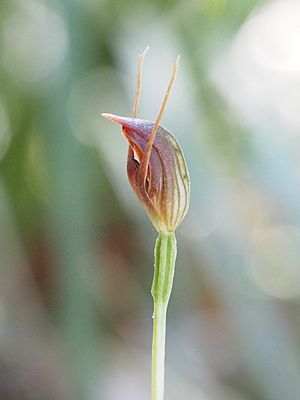Upright maroonhood facts for kids
Quick facts for kids Upright maroonhood |
|
|---|---|
 |
|
| In Bongil Bongil National Park | |
| Scientific classification | |
| Genus: |
Pterostylis
|
| Species: |
erecta
|
The upright maroonhood (scientific name: Pterostylis erecta) is a special type of orchid. It only grows in eastern Australia, which means it's endemic there. When this plant flowers, it has a group of four to seven dark green, crinkly leaves that look like a rosette. Its flowers are usually greenish to reddish-brown. You can find this orchid in New South Wales and south-eastern Queensland.
What Does It Look Like?
The upright maroonhood is a plant that grows on land, not on trees. It's a perennial plant, meaning it lives for more than two years. It's also deciduous, so its leaves fall off at certain times. This plant is a herb and has a special underground storage part called a tuber.
When the plant is flowering, it has a rosette of four to seven dark green, crinkly leaves. Each leaf is about 1.5 to 5 centimeters (0.6 to 2 inches) long.
A single flower grows on a tall stem, which can be 15 to 35 centimeters (6 to 14 inches) high. The flowers are usually greenish, reddish-brown, or even dark chocolate brown. They are about 1.8 to 2.2 centimeters (0.7 to 0.9 inches) long.
The top part of the flower, called the "galea," looks like a hood. It's made from the dorsal sepal and the petals joined together. The dorsal sepal is a bit longer than the petals and has a sharp point. There's a clear space between the petals and the lower parts of the flower, called the lateral sepals. The bottom part of the flower has a small notch in the middle.
The "labellum" is a small, tongue-like part of the flower. It's brown, about 6 to 7 millimeters (0.2 to 0.3 inches) long, and can just be seen from the front. These orchids usually bloom from August to September.
How It Got Its Name
The upright maroonhood, Pterostylis erecta, was first officially described in 1958. A scientist named Trevor Edgar Hunt wrote about it after finding a sample near Samford in Queensland. His description was published in a science journal called Proceedings of the Royal Society of Queensland.
The second part of its scientific name, erecta, comes from a Latin word. It means "upright," which describes how the flower stands tall.
Where It Grows
The upright maroonhood orchid mostly grows in forests along the coast and near the coast. You can find it from Moruya in New South Wales all the way north to south-eastern Queensland.

